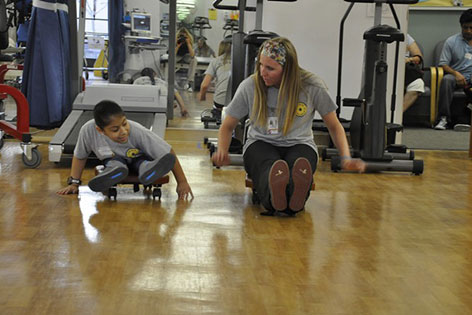 |
|
Exercise training in children with spina bifida
Pilot project shows the health benefits of exercise
Most children with disabilities of the muscle and nerves are not able to engage in normal physical activity and exercise.
Consequently, they miss out on the critical benefits of exercise on the growth of muscle and bone, helping to prevent obesity and accompanying heart and metabolic diseases, and on learning and behavior.
Physical inactivity also may actually worsen disease symptoms associated with the underlying impairment.
The National Institutes of Health recently recognized the potential therapeutic importance of exercise in children with neuromotor disabilities and the lack of the most basic knowledge on how to conduct well-designed studies to gauge such effects in this difficult-to-evaluate population. The NIH has called for research focused on innovation in implementing exercise programs in children with disabilities and in new approaches to measuring fitness and exercise responses in these children.
At the UC Irvine Pediatric Exercise and Genomic Research Center (PERC), we have modified the model of the "I Can Do It, You Can Do It" (ICDI) program from Slippery Rock University in Pennsylvania, an institution known for its adaptive PE program. ICDI is based on training college-students to serve as physical activity mentors for children with disabilities.
Working with our colleagues at Miller Children’s and Women's Hospital Long Beach, led by Dr. Kimberly BeDell, we implemented ICDI with a group of children who have spina bifida. This condition doesn't allow the spinal cord to develop normally, leaving children with substantial neuromotor impairment of their lower extremities. We also worked with the recreation therapy program of Cal State University, Long Beach, and trained students to act as mentors.
During the week before and following the last week of the exercise intervention, we invited the participants to come to our research center at UC Irvine to assess their fitness and cognitive function.

